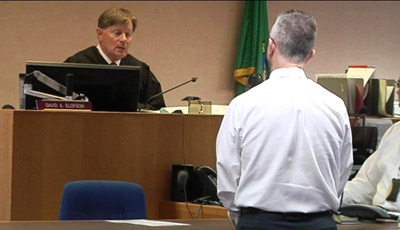Obey summons if not 'Mr. Warrant' will catch you
by Justice P.H.K. Kulatilaka
Part 2
In view of the increasing numbers in road accidents certain
amendments were introduced to the Motor Traffic Act. Under the
provisions of section 151 the policeman has powers of arrest without a
warrant if he was of the opinion that the driver was unfit to drive
because he was drunk. Recently a daily paper carried a news item titled
'Drunk don in the cooler' which stated that the police had arrested a
lecturer who was found drunk while driving. This is a case in point.
 It is also a mandatory requirement of the law that the police officer
'shall inform' the person the nature of the charge. It is also a mandatory requirement of the law that the police officer
'shall inform' the person the nature of the charge.
Article 13 of the Constitution also prescribes that such person
'shall be informed of the reason for his arrest'. In caring for the
personal liberty of the subject so arrested the Constitution saw to it
that the police will produce him before the judge of the nearest
competent court without undue delay according to the procedure found in
the Code of Criminal Procedure Act as amended .
Human Rights
The law enforcement officer has to be very careful in exercising the
powers of arrest for in the event of abusing his powers he may have to
face the allegation of violating Human Rights. There can be instances
which enable the so arrested person invoking the delictual remedy for
false imprisonment in a civil court. These provisions are there with a
view to balancing of social security on the one hand and the personal
liberty of the subject on the other.
Breach of the peace
Though a police officer could arrest any person who commits a breach
of the peace in his presence, at a time when there are frequent
demonstrations in the country to save their skin policemen rush to court
to arm themselves with a warrant of arrest. The Magistrates are slow to
accede or act with restraint to such requests for two reasons, firstly
the demonstrators may be acting in the exercise of their fundamental
rights afforded to them by the Article 14 of the Constitution. Secondly
section 32 of the Code of Criminal Procedure Act gives the police the
power to arrest without a court warrant in the event of a breach of the
peace. In a decided case Supreme Court Judge Justice Dheeraratne gave
the following warning to the Magistrates in issuing a warrant. The law
enforcement officers should well know about it.
'Issuing a warrant is a judicial act involving the liberty of an
individual and no warrant of arrest should be lightly issued by a
Magistrate simply because a prosecutor or an investigator thinks it is
necessary. It should be issued as the law requires when a Magistrate is
satisfied that he should do so, on the evidence taken before him on
oath'.
The police complaint will disclose the name or names of the people
suspected or accused of, being concerned in committing or having
committed a non-bailable or bailable offence.
The law requires the presence of these persons in court to proceed to
inquiry or trial. Issuance of summons or warrants as the case may be is
the mechanism a court makes use of to get them to court.
Summons
The first schedule to the Code of Criminal Procedure Act specifies
offences where summons should go in the first instance. Summons will
indicate the particulars of the offence charged, time and place he
should appear. Magistrate may if he thinks fit issue summons in the
first instance even if it is a case where a warrant should be issued.
When a person obeyed the summons and appeared before the court in terms
of the provisions of the Bail Act 'he shall be enlarged on his own
recognizance or his giving an undertaking to appear when required. It is
a concession granted for obeying summons.
Warrant
You cannot run away from court. The law is no respecter of people.
All the people are equal before the law. If you disobey summons court
issues a warrant. When issuing a warrant since it is a judicial act
involving the liberty of a subject the Magistrate should do so as the
law requires when he is satisfied that a warrant should go.
If the designated police officer has reasons to believe that the
person to be arrested has entered into or within any place the statute
gives him power to enter such place and arrest such person.
If such person resists or attempts to evade arrest the police may use
such means as are necessary to effect the arrest. When such people are
produced in court to ensure his presence in the future he would be
either remanded or enlarged on heavy bail.
Nevertheless the Magistrate's Court has no power to grant bail to an
accused or suspect in an offence punishable with death or with life
sentence in which case it is the provincial High Court which has the
power to grant bail.
The law will not allow a person to run away or abscond. There is
provision for the court to proceed with the inquiry or trial as the case
may be in the absence of the accused. He forfeits the opportunity given
to him by the law to be present in court and defend his case.
The writer is a retired judg of the Court of Appeal and former
Director, Sri Lanka Judges' Institute.
Concluded
|

